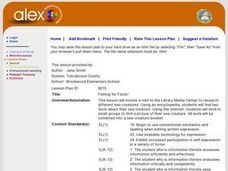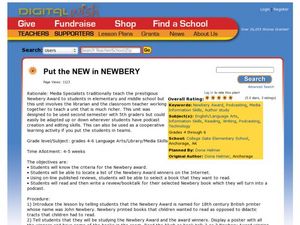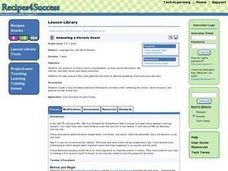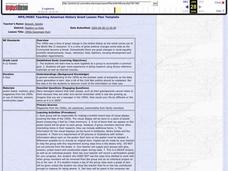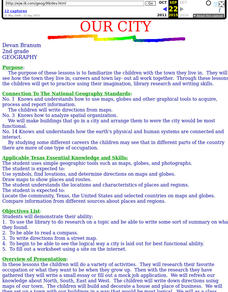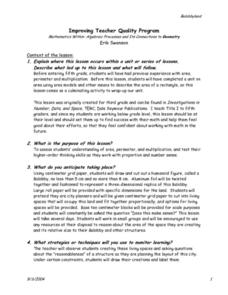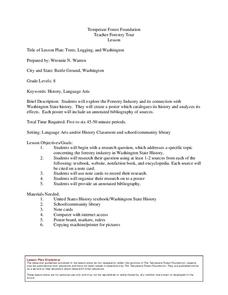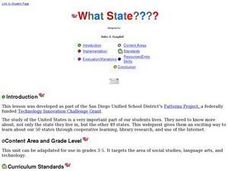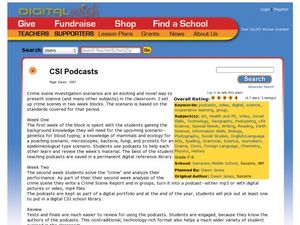Curated OER
Rules
Students read about an autistic boy and learn about how he communicates. In this picture book summary lesson, students draw illustrations of events in the story that convey the theme.
Curated OER
Regions of the United States
Fifth graders collect data about regions of the United States using the Internet, library books, and encyclopedias. They write an essay persuading people to visit their state.
Curated OER
The Art Box
Sixth graders create a 3-D Art Box in this design-oriented art project for the 6th grade. Rubric is included for grading purposes. The elements of design are covered and applied (includes line, form, texture, shape, value, color, and...
Curated OER
Fishing for Facts!
First graders visit the library or media center to research sea creatures using encyclopedia. They find two facts and research the Internet to find a picture of the sea creature. They create a class sea creature booklet.
Curated OER
Animal Diaries
Learners read Diary of a Worm by Foreen Cronin. In this journal writing lesson, students research an animal and write a diary by their animal. Learners apply the research they've completed in their writings. Students share their diaries....
Curated OER
Put the NEW in NEWBERY
Students read Newbery award books. In this Newbery book lesson, students look online to find all the books that have received this award and look through online reviews to find one they would like to read. After finishing the book, they...
Curated OER
The People of Kansas: Where did they come from and why did they come?
Students review census data to correlate to emigration in Kansas. In this Westward Expansion instructional activity, students analyze a painting and create definitions for emigration and discuss why people emigrate. Students read and...
Curated OER
Animating a Historic Event
Research a historic event using textbooks, primary source documents, the Internet, and other library and media resources. Young historians will take the research they have gathered and write an attention-grabbing, historically accurate...
Curated OER
Amazing Animal Alliteration Book
Students understand the meaning of alliteration. In this alliteration lesson, students write sentences using alliteration and recognize how it changes the writing in a story.
Curated OER
A is for Area, B is for Billion
Students interact with math terminology in preparation for standardized assessment. In this math terminology and online storybook lesson, students create their own booklets of math terms based on each letter of the alphabet. Over the...
Curated OER
1950's Scavenger Hunt
Students encounter how to work together as a group to accomplish a common goal. They gain more experience in doing research using library reference materials as well as internet sources. Each group is responsible for making a bulletin...
Curated OER
Exploring Tessellations
Fifth graders examine how to make tessellations. For this tessellation lesson, 5th graders review the meaning of the word "polygon" while the teacher shows them various examples. They practice making tiling patterns or tessellation's...
Curated OER
Beginning with Bosch
Students explore surrealism through the artwork of Hieronymus Bosch. In this surrealism instructional activity, students understand the characteristics of the art of Bosch and create an original artwork and poem to go with it.
Curated OER
History of Chemistry: The Alchemists
Young scholars research alchemy and the history of chemistry. In this chemistry history lesson, students examine laboratory apparatus and compare it to those used by the Alchemists. Young scholars complete a research paper on an...
Curated OER
Our City
Second graders familiarize themselves with the town they live in by practicing their imagination, library research and writing skills.
Curated OER
Balobbyland City Planners
Students create a mini city using proportions that fit a model human they construct using tin foil. They plan the city including a library, sports arena, living spaces, parks and businesses. When constructing the paper buildings, they...
Curated OER
Trees, Logging, and Washington
Eighth graders explore how the Forestry Industry and Washington State history are related. In this forestry lesson, 8th graders research research a specific topic related to the forestry industry. Students write notes on note cards.
Curated OER
Forest Ecosystem
Learners take a field trip and explore a temperate rainforest. In this rainforest lesson plan, students discuss many items they see on their journey and experiment with different tree leaves.
Curated OER
What State????
Students study the United States. They research not only the state they live in, but the other 49 states. This webquest gives them an exciting way to study about our 50 states through cooperative learning, library research, and use of...
Curated OER
Lights, Camera, Action!
Students develop a communication project about city wildlife. In this wildlife service project lesson, students research city wildlife, create a presentation of their groups choice, and present their findings. Students evaluate how their...
Curated OER
CSI Podcasts
Learners investigate crime scene scenarios to meet standards. In this crime scene scenario instructional activity, students gather background information during the first week. They investigate topics such as mammals, genetics, bacteria,...
Curated OER
Peacemaker Biographies
Students examine the lives of people who stood up for their beliefs. In this biography instructional activity, students research the lives of people such as Gandi, Martin Luther King, Rosa Parks and Robert Kennedy. Students use a graphic...
Curated OER
Botanical Discoveries
Sixth graders examine the Lewis and Clark Expedition. For this plant discovery lesson, 6th graders put in chronological order the plant discoveries of Lewis and Clark. Students understand the characteristics of leaves and find the area...
Curated OER
Reference Resources: Being a Good Detective
Learners explore a variety of reference resources while seeking information. atlases, almanacs, dictionaries, encyclopedias, thesauri, and online search engines as well as library card catalogs are utilized in this instructional activity.





